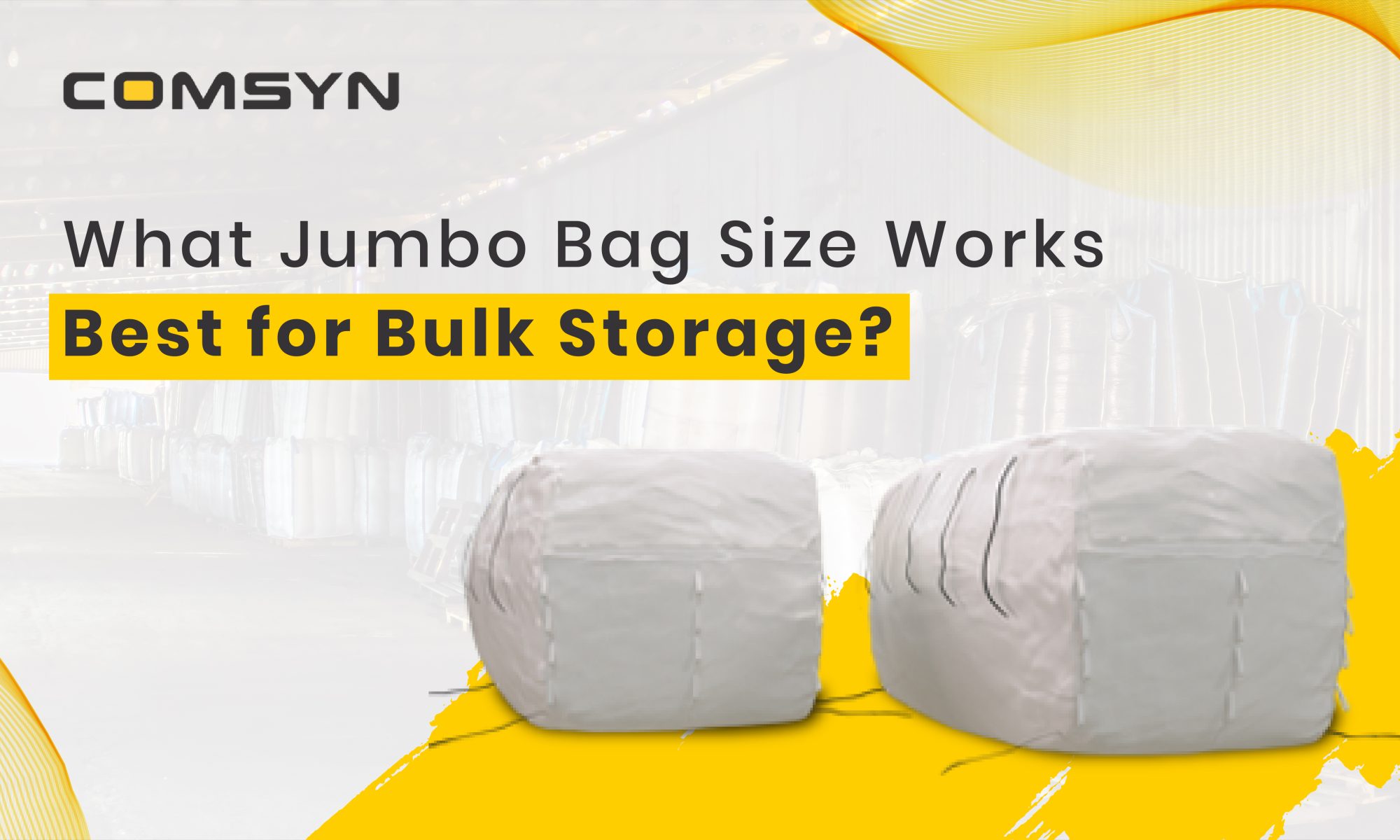Comsyn is a leading manufacturer and supplier of jumbo bags purveying a comprehensive range of solutions engineered to suit the specific requirements of an industry. Proper selection of size and type would cause efficacious utility and minimal not-to-waste in terms of business operations, thereby optimizing the use of space. Choosing the right size of a jumbo bag is of utmost importance for safety, efficiency, and economy in bulk storage and transportation. Firstly, one that is too small will cause overfilling, while an oversized one can waste a lot of valuable space and increase handling costs. Comsyn offers a vast variety of jumbo bags, catering to specific industries and storage needs. Whether for agricultural products, chemicals, or construction materials, the extensive catalog offered by Comsyn has the perfect solution for every need. The right bag size protects its contents while contributing towards frictionless logistics, which adds to the reduction of operational costs. To properly comprehend what it means by a jumbo bag, one would need to decide among the various types available. Jumbo bags are divided into types based on construction and functionalities; each has advantages depending on the application needed. -Circular (Tubular) Bag: These bags are made from a seamless tube of fabric. Circular jumbo bags are ideal for fine powders and granular materials. The sizes of ma jumbo-bag in this category usually range from 500 to 2000 kg. -U-Panel Bag: Having two side panels and a bottom panel, U-panel bags provide great load stability and are highly employed for heavier products. This design is more evenly distributed with less tendency to bulge. -Four-Panel Bags: A bag made from four panels sewn together that are quite rugged and sturdy. This design offers maximum storage capacity and strength; transporting heavy loads is preferentially done. -Baffle (Q) Bag: Baffle bags contain internal baffles to retain their shape when filled. This improves stackability and space utilization. The size of the bag ensures that the storage space is utilized most efficiently, not compromising stability. -Ventilated Bags: The bags are for keeping perishable goods such as potatoes, onions, and firewood. The ventilated fabric allows air to penetrate through, preventing spoilage. -Conductive (Type C) Bags: Type C bags are made of conductive material and are quite conductive themselves to prevent static build-up. These bags should always be grounded when in use, as handling flammable materials can be dangerous if static charges build up and ignite the materials. -Dissipative (Type D) Bags: Made from special anti-static fabric, D bags dissipate static charge without grounding. These types are preferred in high-flammability environments, which is far better than normal conductors. Some factors need to be taken into account whenever choosing the correct jumbo bag size to ensure maximum efficiency and safety. Jumbo bags have great versatility to suit a wide range of industries. Agriculture Ventilated sacks seem best for storing crops, seeds, or fertilizers. In the construction industry, U-panel and four-panel bags are used for transporting sand, cement, and gravel. Conductive and dissipative composite bags in the chemical industry guarantee the safe handling of such hazardous chemicals. Circular bags are widely used in the food industry for storing and transporting flour, sugar, and other bulk food products. Optimum jumbo bag size selection is essential for secure and efficient bulk storage operation and transport of materials. Companies help businesses select the most appropriate solution for their needs in different jumbo bags and their applications. Comsyn is a reliable provider of high-quality products ranging from jumbo bags to an array of options for the diverse requirements demanded by various industries. Be it a standard solution or a custom jumbo bag size, Comsyn’s expertise ensures that you receive the best product for your unique application. 1. What are jumbo bags, and what are their common uses? Jumbo bags are large, durable containers used for bulk storage and transport of materials like grains, chemicals, cement, and powders across industries. 2. What are the different types of jumbo bags available in the market? 3. How do I choose the right type of jumbo bag for my needs? Choose based on the material, weight capacity, discharge options, and the specific industry requirements for safe and efficient bulk handling. 4. What materials are jumbo bags made from? Jumbo bags are typically made from woven polypropylene, with coated or uncoated fabric, offering UV resistance and anti-static properties. 5. What are the standard sizes and capacities of jumbo bags?What Jumbo Bag Size Works Best for Bulk Storage?

Jumbo bags or FIBCs serve in bulk storage and transportation in almost all industries. Wide, fairly sturdy bags are built to handle such huge quantities of materials: whole grains, chemicals, cement, and powders. It is important to choose the correct jumbo bag size, as this would facilitate efficiency and maintain product safety. Jumbo bags are named in various sizes, depending on the materials used and their respective bulk materials, purpose, and loading capacities.Importance of Choosing the Right Jumbo Bag
Types of Jumbo Bags
Key Features to Consider
Applications of Different Jumbo Bags
Conclusion
FAQ
Jumbo bags come in Circular, U-Panel, Four-Panel, and Baffle designs, with options like ventilated, conductive, and dissipative bags for specialized needs.
The standard size of the jumbo bag ranges from 500 kg to 2000 kg, with custom options available to fit specific bulk storage needs.
- About Us
- Products
- Markets Served
-
- Investor Relation
- Board Of Directors
- Committees Of Board
- Corporate Governance
- Financials
- Annual Report
- Key Managerial Positions
- Shareholding Pattern
- Notices
- Policies Programme
- Announcements
- Statement of Investor Complaints
- Unpaid & Unclaimed Dividend
- Prospectus
- Investors Contact
- Subsidiary Financials
- IEPF
- Preferential Issue – 2024
- MOA & AOA
- Integrated Filing
- Sustainability
- Contact Us
- TechTex
- Brochure

